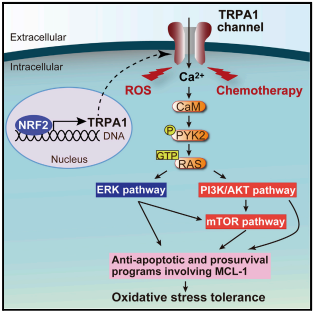Cancer Treatment through TRPA1 antagonism
Researchers in Joan Brugge’s lab have identified a new cancer therapeutic target in the ion channel transient receptor potential ankyrin 1 (TRPA1). The lab is seeking collaborations with industry partners to expand on these exciting findings.
The discovery was made when the lab investigated the role of reactive oxygen species (ROS) in tumor progression. Although it is known that some cancer cells are susceptible to ROS, evidence suggests that other cancer cells can adapt to survive in an elevated ROS environment. This phenomenon, known as redox adaptation, poses a significant challenge in cancer treatment as many standard-of-care therapies induce cell death through generation of ROS.
When researchers investigated redox adaptation more thoroughly, they discovered that TRP ion channels, and TRPA1 specifically, are highly expressed in diverse tumor types and enable redox adaptation of tumor cells, thereby enabling cancer cell survival and proliferation. The lab also demonstrated that downregulation of TRPA1 suppresses tumor growth and chemosensitivity. Taken together, the findings shed light on fundamental mechanisms of cancer survival and identify a promising cancer therapeutic target to be used concomitantly with standard chemotherapies.
This work was published in Cancer Cell.

Intellectual Property Status: Patent(s) Pending
Case Number: 6563

